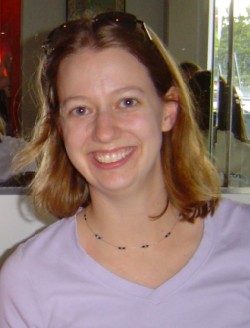The Team
Bethany Ehlmann | Assistant Professor at California Institute of Technology/Research Scientist at the Jet Propulsion Laboratory

Where
did you grow up?
I grew up in Tallahassee, Florida
How
did you get interested in space exploration?
I’ve been interested in space exploration and environmental science since I was a little kid. Planetary sciences is a combination of the two, and I love getting to do both.
What's
your educational background?
I got my undergraduate degree (A.B. Earth & Planetary Sciences, Environmental Studies (double major)) at Washington University in St. Louis. For two years, I attended Oxford University as a Rhodes Scholar, receiving an M.Sc. Environmental Change and Management and an M.Sc. in Geomorphology. In 2010, I completed a Ph.D. in geological sciences at Brown University and then was a Marie Curie fellow at IAS-Paris, prior to arriving at Caltech and JPL.
What
are your hobbies?
I play all kinds of sports, ultimate Frisbee, soccer, and rowing are special favorites. I love to travel, do outdoorsy things, and am also keenly interested in public policy.
What's
your job on CRISM?
I work on the science side and have two major roles. I help to select regions of the planet of highest interest for which we then acquire CRISM images. Once those images are received, I analyze the images and the spectra to understand what they tell us about Mars geology, mineralogy, and environmental history.
What
excites you about exploring Mars?
Mars is in a many ways a colder, smaller cousin of Earth’s. We see that in the past (more than 3 billion years ago), it was a lot like Earth with liquid water and active volcanoes. Life on Earth evolved around just this time. Did life evolve on Mars? Why did Mars change, becoming the cold dry planet we see today? What can this tell us about how the Earth system has kept our planet habitable for billions of years? These big picture questions are what most excite me about Mars. Plus, it’s very fulfilling when your job entails working with extremely talented, dedicated people, and when you walk into work in the morning and look at a photo from another planet that has never been seen before!
What
advice would you give to someone like you who wants to get involved in space exploration?
NASA is found in schools and universities around the country so keep your eyes out for talks by scientists and engineers – talk to them more afterwards, we’re a pretty approachable bunch. If you’re an undergrad or grad student, do a NASA summer internship. Follow the NASA mission websites for the latest information and get your friends excited about space exploration too.
